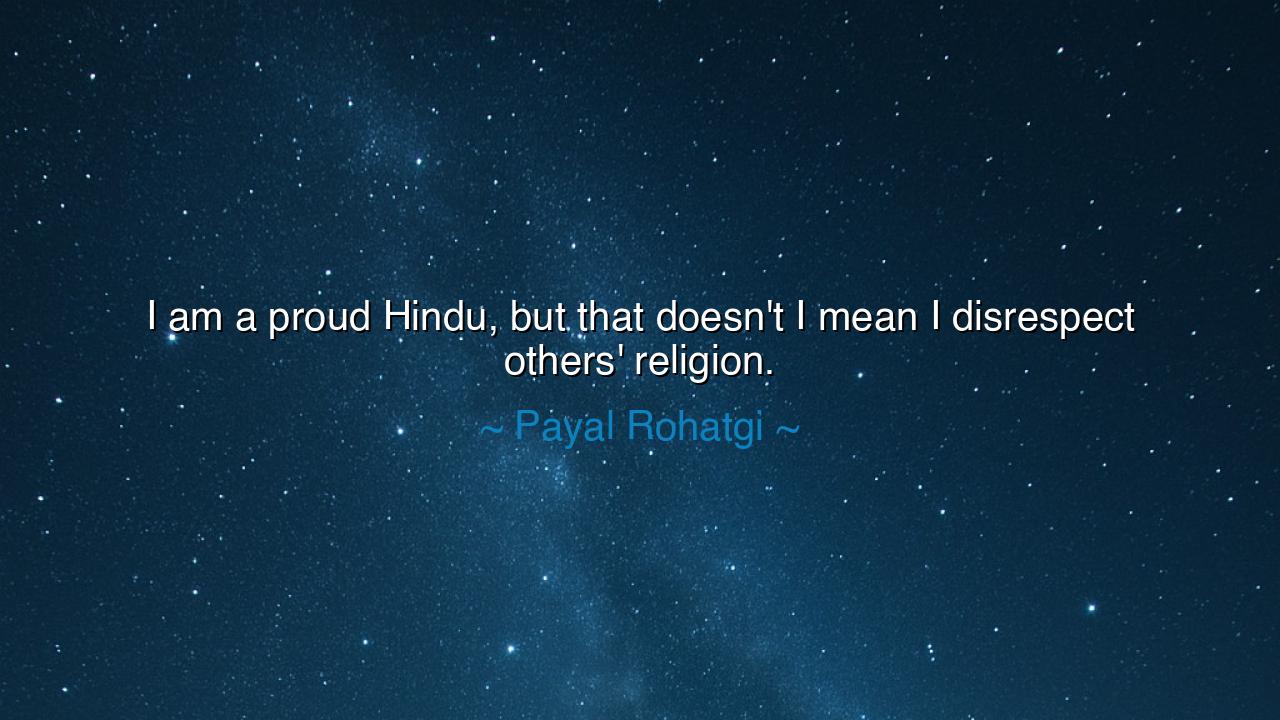
I am a proud Hindu, but that doesn't I mean I disrespect others'






"I am a proud Hindu, but that doesn't mean I disrespect others' religion." These words from Payal Rohatgi encapsulate a deep and essential truth about faith and respect—the idea that one’s pride in their own religion need not come at the expense of respect for others. Rohatgi’s declaration challenges the notion that religious devotion is synonymous with intolerance or disrespect. It suggests that faith—in whatever form it takes—should be a source of strength and identity, but not a means of division. To be proud of one's beliefs is a right, but it must be tempered with humility and an awareness that others, too, have the right to their own paths and practices.
In the ancient world, the interplay between pride in one’s beliefs and the respect for others' religions was a subject of profound contemplation. The great philosophers of Greece, like Socrates, Plato, and Aristotle, believed that understanding the world required engaging with multiple perspectives, not just one. Socrates, in particular, advocated for an open dialogue between individuals of differing beliefs, recognizing that through respectful conversation, one could come to a deeper understanding of truth. The Hindu tradition itself—one of the oldest and most diverse religious systems in the world—teaches the importance of tolerance and respect for all beings, emphasizing that the truth of existence is vast and multifaceted.
Consider the example of Mahatma Gandhi, whose deep connection to Hinduism did not prevent him from respecting and learning from other religious traditions. Gandhi believed that truth and spiritual wisdom could be found in all religions, from Christianity to Islam, and he often cited the teachings of Jesus and Prophet Muhammad as sources of moral inspiration. Despite his profound Hindu faith, Gandhi’s commitment to religious tolerance led him to seek unity and peace between India’s religious communities. His example teaches us that being proud of our own beliefs does not require us to disrespect or disregard others' paths. On the contrary, embracing the common humanity in all religious traditions leads to greater understanding and harmony.
This principle is echoed in the teachings of the Buddha, who, though he founded a new religion, spoke with respect for other spiritual paths. He taught that all beings, regardless of their religion or background, could achieve enlightenment through the cultivation of wisdom, compassion, and mindfulness. Buddha’s path was one of inclusivity, inviting all who sought to end suffering to join in the pursuit of truth. By demonstrating respect for others’ beliefs, even while advocating for his own, Buddha showed that true wisdom transcends the boundaries of religious labels. His words continue to resonate in modern times, where the interfaith dialogue is vital for global peace and mutual respect.
In the contemporary world, religious conflict continues to be a significant source of division and violence. However, figures like Malala Yousafzai, a devout Muslim, and Dalai Lama, a committed Buddhist, have shown us that faith does not have to lead to division. Both have advocated for education, peace, and tolerance, emphasizing that one’s religion should serve as a foundation for compassion and understanding, rather than for hatred or superiority. The example set by these leaders mirrors Rohatgi’s sentiment: we must honor and celebrate our individual spiritual paths while maintaining respect for the diverse beliefs that others hold.
The lesson in Rohatgi’s words is timeless: pride in one’s faith should never be used as an excuse for disrespecting others. Instead, true spirituality calls us to live by the principle of respect for all, understanding that the divine manifests in many ways across cultures and religions. By respecting others' beliefs, we create a space for mutual growth, understanding, and peace. Tolerance, therefore, is not a passive acceptance, but an active choice to celebrate the diversity of human experience and belief.
In our own lives, we should strive to live proudly in our own faith, whatever it may be, but also listen with open hearts to others. Let us find common ground in the shared human experience, recognizing that each person’s journey toward truth is as sacred as our own. When we encounter others whose beliefs differ from ours, let us not see them as threats, but as opportunities for growth, for they may have wisdom and experiences to share that broaden our own understanding of the world and the divine. Just as Rohatgi finds pride in her Hinduism without disrespecting other religions, so too should we cultivate a life of proud faith, balanced with humility and respect for the spiritual paths of others. Through this, we can create a more peaceful and united world.






AAdministratorAdministrator
Welcome, honored guests. Please leave a comment, we will respond soon